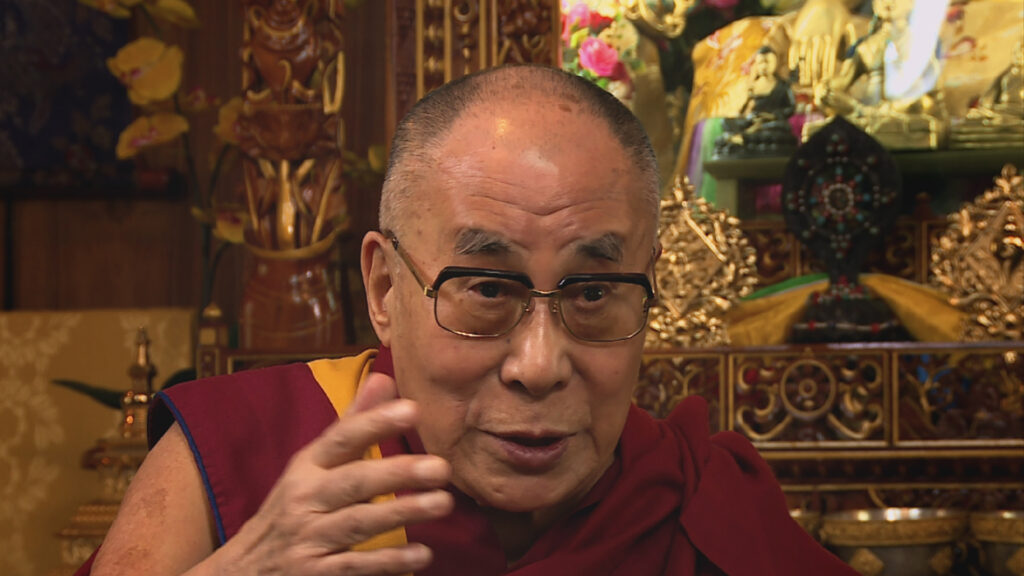April 1, 2022
by Carla Hay

Directed by Jean-Paul Mertinez
Some language in Mandarin and Hindu
Culture Representation: Taking place in India and other parts of the world, the documentary film “Never Forget Tibet” features a racially group of Asian and white people representing the working-class, middle-class and wealthy, who all discuss the life and legacy of the 14th Dalai Lama, also known as Tenzin Gyatso.
Culture Clash: The 14th Dalai Lama (also known as Tenzin Gyatso), who is a spiritual leader and the former head of state of Tibet, has been refugee in India, since 1959, when he escaped to India after China’s invasion of Tibet.
Culture Audience: “Never Forget Tibet” will appeal mainly to people who are interested in the Dalai Lama, Chinese history, spiritual leaders, human rights activists and refugees.

The documentary “Never Forget Tibet” is subtitled “The Dalai Lama’s Untold Story,” which isn’t an entirely accurate description. Much of the documentary is essentially biographical information that can be found on the Wikipedia page of the 14th Dalai Lama, who is also known as Tenzin Gyatso. It’s not exactly “an untold story,” but the documentary is a good history lesson for anyone who knows next to nothing about this extraordinary person. For people who already know a lot about the Dalai Lama, the main reason to see the documentary is for the exclusive footage of him talking about his refugee journey and reuniting with Har Mander Singh, the former politician/diplomat who helped guide the Dalai Lama when the Dalai Lama escaped as a refugee from Tibet to India in 1959.
Directed Jean-Paul Mertinez and narrated by actor Hugh Bonneville, “Never Forget Tibet” shows a brief, exclusive interview that journalist Rani Singh did with the Dalai Lama, who rarely gives one-on-one interviews. Rani Singh had an inside track to get the interview because her father happened to be Har Mander Singh, who died in 2020, at the age of 94. Rani Singh doesn’t do much questioning in the interview (she seems more than a little star-struck), but she is content to just let the Dalai Lama share his memories while she nods in agreement. Fathom Events released “Never Forget” as a one-night-only event in U.S. cinemas on March 31, 2022, the 63rd anniversary of the Dalai Lama’s 1959 escape from China-occupied Tibet.
Born as Lhamo Thondup in Tibet on July 6, 1935, his name became Tenzin Gyatso, and he became the 14th Dalai Lama in 1940. He was Tibet’s head of state from 1963 to 1991. This Dalai Lama has become world-renowned as an advocate of peace and spirituality, but China still officially considers him to be an enemy of the state. Environmental journalist Nithin Cocoa, who is one of the people interviewed in the documentary, comments on the Dalai Lama’s status as a political refugee from China: “No matter what the Chinese government tries to do, they can’t take down his moral standing.”
Cocoa goes into details about how people in China are still targeted and under surveillance if they show any interest in the Dalai Lama. He also mentions that droughts in Tibet and parts of India could be attributed in part to the Chinese government’s role in controlling the Great Wall’s cutting off of bodies of water. The Dalai Lama says in the documentary that although technology has made the world a better place, damage to the environment is the biggest threat to humanity.
Har Mander Singh shares his memories of the first time he met the Dalai Lama and what it was like to get to know him when Har Mander Singh had the responsibility of helping the Dalai Lama navigate through India as a refugee. A highlight of the documentary is when the Dalai Lama and Har Mander Singh reunite for the first time in years. It might bring tears to some viewers’ eyes.
In his interview, Dalai Lama says that when he was living in Tibet, he became “close friends” with Mao Zedong, also known as Chairman Mao, the founder of the People’s Republic of China. The Dalai Lama mentions that at one point, he wanted to join the Communist Party. When the Dalai Lama told a friend about it, the friend advised him to wait. It wasn’t long before China invaded Tibet.
Also interviewed in “Never Forget Tibet” is Ahimsa publisher/president Leslie Di Russo, who shows some rare Dalai Lamai archives in the Heinrich Harrer Limited Edition Portfolio; Bon Tibetan religious teacher Tenzin Wangyal Rinpoche; Rinchen Khandro Choegyal, founding director/special advisor of the Tibetan Nuns Project, who talks about how educations has improved for nuns over the decades; and Ngari Rinpoche (also known as Tenzin Choegyal), the Dalai Lama’s youngest brother and the partner of Rinchen Khandro Choegyal; Richard West, also known as music artist Mr. C; and Sikyong Dr. Lobsang Sangay, president of Central Tibetan Administration.
“Never Forget Tibet” isn’t a very well-edited movie. Parts of the documentary jump around in a somewhat incoherent storytelling manner, while other sections of the movie have pacing that is a bit tedious. However, it’s hard not to be riveted by the Dalai Lama’s story, regardless of any prior knowledge that a viewer might have about him before seeing this documentary.
At the Fathom Events screening, the documentary was followed by a pre-recorded videoconference Q&A that the Dalai Lama did with various young people around the world, in a session hosted by PeaceJam. He said the usual things about how compassion and spirituality are important for humanity, and he gave a lot of rambling answers. The Dalai Lama also mentioned that modern people are “wiser” than previous generations because of education and technology. “Never Forget Tibet” is not a groundbreaking chronicle of the Dalai Lama, but it’s an interesting peek inside the mind and memories of a historical figure whose impact transcends borders and political beliefs.
Fathom Events released “Never Forget Tibet” in U.S. cinemas as a one-night-only event on March 31, 2022.

